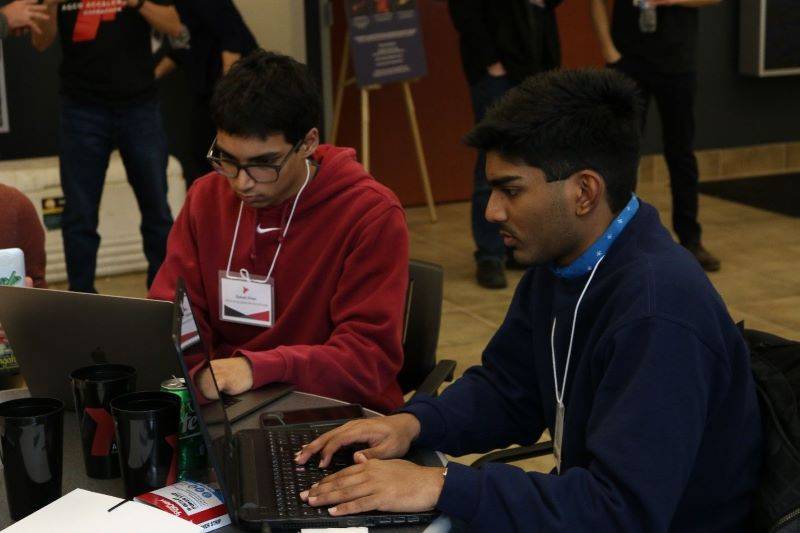This weekend is the 2nd annual AGCO Acceleration Hackathon — which will be happening at the National Center for Supercomputing Applications — where students will come together for challenges that bring technology innovation to the world of agriculture. AGCO is, “a global leader in the design, manufacture and distribution of agricultural solutions.” Misha Shah, Site Manager for the acceleration center shared about the hack, as well as the work they are doing every day.
Smile Politely: Can you give me a little background on the AGCO Acceleration project? What are your employees working on day to day?
Misha Shah: The AGCO Acceleration Center opened in August of 2017 at the Research Park. The AAC was initially opened to serve three purposes: Help recruit students that will be our next generation of AGCO leaders, utilize the expertise of the University of Illinois faculty in agricultural and computer science engineering design, share an ecosystem with entrepreneurs who are developing the new technologies to stay on the cutting edge of the ever-changing agriculture industry.
Since then, and particularly in the last year we’ve seen tremendous growth. The AAC now hosts 20+ interns reporting to various parts of AGCO Corporation. Our interns cover a ton of ground including Augmented Reality, Software Engineering, Data Analytics, Advanced Analytics, Machine Learning, Cloud Engineering and much more. Over the next two years the AGCO Acceleration Center is focused on moving from start-up phase to growth phase, with a laser focus on creating larger impacts on the company’s bottom line. In this growth phase, we will expand and diversify our talent pipeline so we can attract and keep the highest skilled students working to feed the world. We will continue to digitize our business tools and processes to provide better experiences for all of our customers, and continue exploring augmented reality and other emerging technologies that will help us develop and provide our next generation of high-tech solutions for farmers feeding the world. Finally, we will expand our relationships with faculty and the surrounding ag tech ecosystem to partner on new cutting edge areas of research that will generate innovations in agriculture that we never could have imagined two years ago.
SP: Is this the first hackathon you’ve hosted? What was the inspiration for doing one?
Shah: This is the second Hackathon hosted by the AGCO Acceleration Center. This 24-hour build session on innovation in agriculture brings together student tech talent and community engineers, developers, and designers to focus on break-through technology. It’s a great way for students and the community to learn more about AGCO but also for us to provide a platform where the community can solve real world challenges that help us solve the problem of feeding the world.
SP: Who is this hackathon for? Who do you think would get the most out of it?
Shah: The Hackathon is open to anyone 18 or older but is really focused on the tech student talent. We’re hoping to give them a platform to showcase what they’re learning in school, while contributing to a greater world problem. I think anyone in the community engineering background (developers/engineers/designers) would find value in the event. Another value add is that AWS (Amazon) is partnering with us on the event, so it’s a great opportunity to learn about how to use their tools and apply them to engineering challenges.
SP: What will be the focus of the hack?
Shah: There are three focus/challenge areas:
Challenge 1: As the world’s food producers, we use many pieces of high tech equipment to produce food for the world. When our equipment is broken or is out of use for scheduled service, it costs us thousands of dollars/hours in lost revenue and puts the quality of our food at risk. We challenge you to use our crop and livestock equipment data to help us develop optimized maintenance programs/applications that prevent breakdowns and identify the precise time our equipment needs serviced so we can increase revenue and produce the highest quality food possible.
Challenge 2: Producing the world’s food is a tough job and it is becoming increasing difficult to find people to work on our farms. We challenge you to look at our equipment data to help us benchmark and optimize our farms performance and then develop programs/applications that will 1) replace human labor with optimized automated controls or 2) provide less skilled labor with the tools needed to optimize equipment operation performance or 3) on large operations create equipment operator score cards that reward performance based on benchmarked performance KPI’s.
Challenge 3: As the world’s food producers, nothing is more important to us than the land and animals in our care. However, we are often accused of using unsustainable practices to produce the world’s food. We challenge you to help us identify the environmental factors that are considered the most critical for environmental sustainability and then recommend hardware and software solutions that could be used on our equipment that will measure these factors. This will allow us to improve and report on our environmental impact specific to these identified sustainability benchmarks.
SP: Is there anything else you want to make sure our readers know?
Shah: The Hackathon will be a lot of fun and there are great prizes (and good food!) this year. Take a look at the website to learn more.
You can register as a Hacker for the AGCO Hackathon here. Walk ins are accepted, but registration is encouraged. Doors open at 4 p.m. on January 31st, and hackathon submissions are due by 5 p.m. on February 1st.








